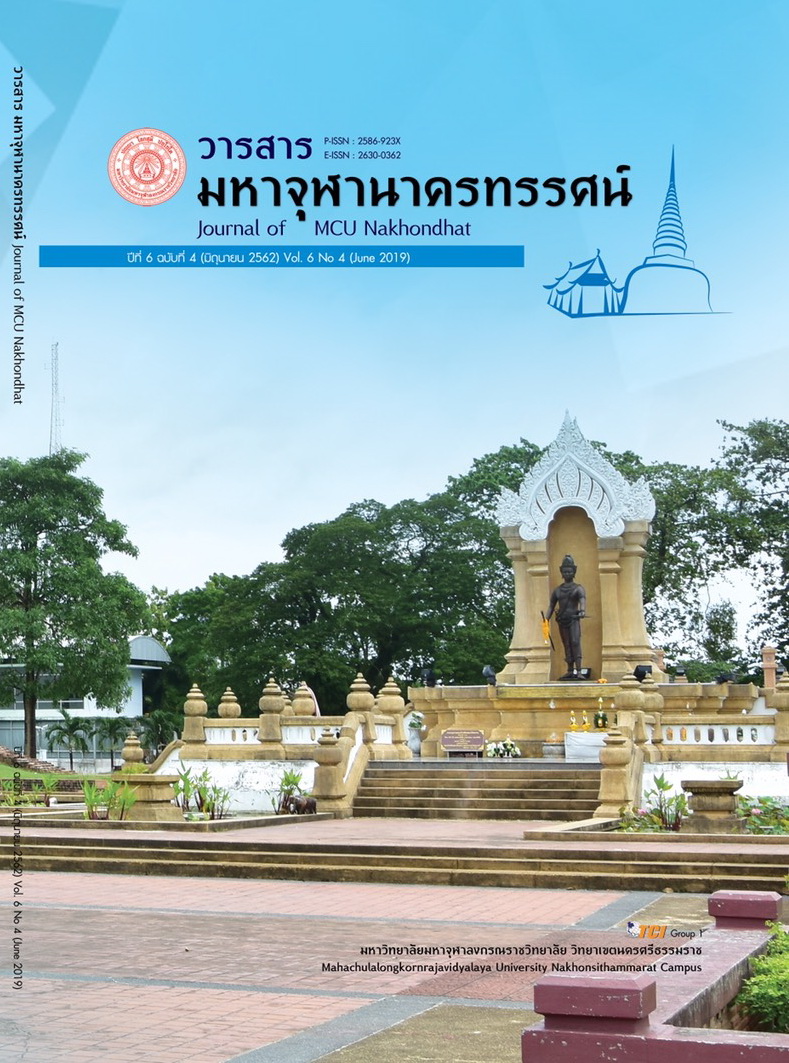A MODEL OF SANGHA ADMINISTRATOR’S SOCIAL WELL-BEING PROMOTION IN THAI SOCIETY
Main Article Content
Abstract
The objectives of this research are 1) to study the social well-being promotion in the Buddhist ecclesiastical official monks in Thailand. 2) To study the model and the process of the social well-being promotion in the Buddhist ecclesiastical official monks in Thailand. 3) To present the model of the social well-being promotion in the Buddhist ecclesiastical official monks in Thailand.
The findings of the research are as follows:
- The social well-being promotion in the Buddhist ecclesiastical official monks in Thailand following to the four principles of wellbeing. It was found that 1) The Physical – Promote the Wednesday Physical Exercise activity, the 9-Square Exercise in the Buddhist monastery and the sports arena including physical check-up 2) The Mind – Enhance the meditation activity in the Buddhist Holy Day, the evening chanting including the new year overnight chanting to support the volunteer activities to be the sustainable power for wellbeing work. 3) The Wisdom – Share things and knowledge to create the model of the community full of kindness, friendship and spiritual supporters 4) The social – The well-being and the Buddhist studies promotion following to the village of the five precepts project and the community relations enhancement.
- The model and the process of the social well-being promotion in the Buddhist ecclesiastical official monks in Thailand. It was found that 1) The Teaching Process – Hold the training projects for mind development. 2) The Participation Process – The participation from the governmental section, the private section and the people to develop the unity of wellbeing. 3) The Management Process – the proper management can enhance the quality of life and wellbeing. 4) The Spiritual Process – It is the new vision about health such as holistic health which focuses on the balance of any parts connecting to the wisdom dimension.
- The model of the social well-being promotion and development in the Buddhist ecclesiastical official monks in Thailand. It was found that 1) The Physical – The promotion to exercise in the Buddhist monastery area and the sports arena, the establishment of the running club and the check-up 2) The Mind – The meditation activity to purify the mind. 3) The Wisdom – The sharing of things and the wellbeing consult including the information to exchange the local wisdom, the value and the good attitude. 4) The Social – The training for the Buddhist ecclesiastical official monks’ development to enhance the wellbeing in the frame of the Buddhism as well as to drive the mobile wellbeing work in the frame of the Buddhism.
Article Details
How to Cite
. พ., . พ., หามนตรี ว., & เจียรจิตต์ ช. (2019). A MODEL OF SANGHA ADMINISTRATOR’S SOCIAL WELL-BEING PROMOTION IN THAI SOCIETY. Journal of MCU Nakhondhat, 6(4), 2140–2154. retrieved from https://so03.tci-thaijo.org/index.php/JMND/article/view/192348
Section
Research Articles
References
กรกฤช ลิ้มสมมุติ. (2558). การพัฒนารูปแบบการสร้างเสริมสุขภาพผู้สูงอายุในชุมชนอำเภอตรอน จังหวัดอุตรดิตถ์. วารสารสมาคมเวชศาสตร์ป้องกันแห่งประเทศไทย, 5(2), 153-161.
ชยภรณ บุญเรืองศักดิ์ และสุทธิพงษ์ เอี่ยมอ่อง. ( 2561). “การจัดการสุขภาวะชุมชนเพื่อเสริมสร้างความเข้มแข็งให้กับชุมชนท้องถิ่น องค์การบริหารส่วนตำบลซับสมบูรณ์ จังหวัดเพชรบูรณ์”. วารสารวิจัยเพื่อการพัฒนาเชิงพื้นที่, 1(1), 57-87.
พระครูใบฎีกาสะอาด ปญฺญาทีโป (ดิษฐสวรรค์). (2558). “การพัฒนาการมีส่วนร่วมของพระสงฆ์ในการส่งเสริมคุณภาพชีวิตในชุมชนในเขตปกครองคณะสงฆ์ภาค 2”. พระนครศรีอยุธยา: มหาวิทยาลัยมหาจุฬาลงกรณ์ราชวิทยาลัย.
พระมหาสุทิตย์ อาภากโร. (2550). “รูปแบบการพัฒนาแหล่งท่องเที่ยวประเภทวัดในกรุงเทพมหานคร”. กรุงเทพมหานคร: สำนักกองทุนสนับสนุนการวิจัย.
สมพันธ์ เตชะอธิก และคณะ. (2553). “คู่มือผู้นำสุขภาวะตำบล: การสร้างนโยบาย ยุทธศาสตร์ โครงการนวัตกรรมสร้างเสริมสุขภาพ, โครงการพัฒนาและวิจัยสุขภาวะชุมชนเพื่อความอยู่ดีมีสุข”. ขอนแก่น: คลังนานาวิทยา.
ชยภรณ บุญเรืองศักดิ์ และสุทธิพงษ์ เอี่ยมอ่อง. ( 2561). “การจัดการสุขภาวะชุมชนเพื่อเสริมสร้างความเข้มแข็งให้กับชุมชนท้องถิ่น องค์การบริหารส่วนตำบลซับสมบูรณ์ จังหวัดเพชรบูรณ์”. วารสารวิจัยเพื่อการพัฒนาเชิงพื้นที่, 1(1), 57-87.
พระครูใบฎีกาสะอาด ปญฺญาทีโป (ดิษฐสวรรค์). (2558). “การพัฒนาการมีส่วนร่วมของพระสงฆ์ในการส่งเสริมคุณภาพชีวิตในชุมชนในเขตปกครองคณะสงฆ์ภาค 2”. พระนครศรีอยุธยา: มหาวิทยาลัยมหาจุฬาลงกรณ์ราชวิทยาลัย.
พระมหาสุทิตย์ อาภากโร. (2550). “รูปแบบการพัฒนาแหล่งท่องเที่ยวประเภทวัดในกรุงเทพมหานคร”. กรุงเทพมหานคร: สำนักกองทุนสนับสนุนการวิจัย.
สมพันธ์ เตชะอธิก และคณะ. (2553). “คู่มือผู้นำสุขภาวะตำบล: การสร้างนโยบาย ยุทธศาสตร์ โครงการนวัตกรรมสร้างเสริมสุขภาพ, โครงการพัฒนาและวิจัยสุขภาวะชุมชนเพื่อความอยู่ดีมีสุข”. ขอนแก่น: คลังนานาวิทยา.


